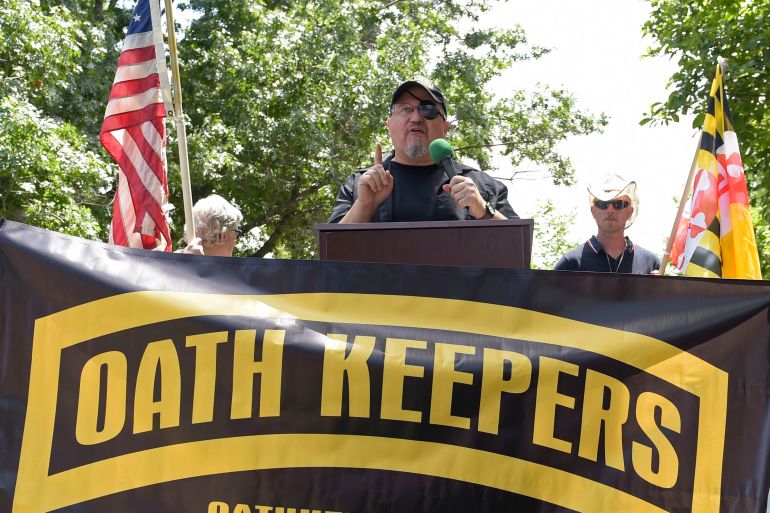Oath Keepers leader says group didn’t plan to storm US Capitol
Far-right group’s Stewart Rhodes tells jurors ‘there was no plan to enter’ Capitol building on January 6 last year.

Oath Keepers leader Stewart Rhodes has told jurors there was no plan for members of his far-right group to attack the United States Capitol on January 6, 2021, as he tries to clear his name in his seditious conspiracy trial.
Taking the stand in his own defence for a second day, Rhodes testified on Monday that he had no idea his followers were going to join the pro-Trump mob to storm the Capitol and he was upset after he found out that some did.
Keep reading
list of 3 itemsFive key takeaways from seventh January 6 US Capitol riot hearing
Trump blasts US Capitol riot hearings as ‘mockery of justice’
Rhodes said he believed it was stupid for any Oath Keepers to go into the Capitol. He insisted that was not their “mission”.
“There was no plan to enter the building for any purpose,” Rhodes testified.
Rhodes is on trial with four other defendants for what prosecutors have alleged was a plan to stage an armed rebellion to stop the transfer of presidential power from Republican Donald Trump to Democrat Joe Biden.
Prosecutors have tried to show that for the Oath Keepers, the riot was not a spur-of-the-moment protest but part of a serious, weekslong plot.
Rhodes’s defence is focused largely on the idea that his rhetoric was aimed at persuading Trump to invoke the Insurrection Act, which gives the president wide discretion to decide when military force is necessary and what qualifies as military force.
Rhodes told jurors he believed it would have been legal for Trump to invoke that act and call up a militia in response to what he believed was an “unconstitutional” and “invalid” election.
“All of my effort was on what Trump could do,” Rhodes said.
Rhodes did not make clear what he would have wanted a militia to do after being called up by Trump.
He said disrupting the certification of the vote was not one of his goals and he expected that the election would be certified.
Prosecutors said Rhodes’s own words show that he was using the Insurrection Act as legal cover and he was going to act no matter what Trump did.
When they get a chance to question Rhodes this week, they are likely to highlight messages such as one Rhodes sent in December 2020 in which he said Trump “needs to know that if he fails to act, then we will”.
‘Surveying his troops’
Rhodes also addressed another key part of the prosecution’s case: a massive arsenal of weapons the Oath Keepers had at a hotel in nearby Virginia. Prosecutors said the guns were an element of a so-called quick reaction force that the group could deploy quickly to Washington.
Rhodes testified the weapons weren’t there for that purpose and said it would have taken a long time to load them into a vehicle and bring them into the city.
Rhodes did not go into the Capitol on January 6 last year, and prosecutors have described him as “a general surveying his troops on a battlefield”.
Rhodes said he merely went to the Capitol to find his Oath Keepers followers who had not been sent on a security “mission” protecting figures such as Roger Stone, a longtime Trump confidant. Rhodes said he didn’t even realise that one of his men went into the Capitol until he saw him in an FBI photo.
Prosecutors have spent weeks methodically laying out evidence that shows Rhodes and the Oath Keepers discussing the prospect of violence before January 6 and the need to keep Biden out of the White House at all costs.
Among their key witnesses were two of Rhodes’s former followers who pleaded guilty in the Capitol attack and agreed to cooperate with investigators in the hopes of getting lighter sentences.
One told jurors that Oath Keepers members were prepared to stop the certification of Biden’s electoral victory by “any means necessary”, including by taking up arms.
Three Oath Keepers who pleaded guilty to seditious conspiracy and struck cooperation deals with prosecutors were notably not put on the stand by the government. It is unclear why.
During cross-examination on Monday, prosecutor Kathryn Rakoczy showed the jury text messages between Rhodes and other Oath Keepers in the lead-up to January 6.
In one text to Rhodes, another Oath Keeper on trial, Kelly Meggs, says he is busy setting up the quick reaction force, also known as a “QRF”. “Ok, we will have a QRF. This situation calls for it,” Rhodes responded on January 2.
Rhodes said some of the messages about the QRF were exchanged in a group chat where he did not always read everything, though he acknowledged being the administrator of the chat. “Sir, the buck stopped with you in this operation, correct?” Rakoczy asked.
“I’m responsible for everything everyone did?” Rhodes asked.
“You’re in charge, right?” Rakoczy said.
“Not when they do something off mission, I’m not in charge,” he replied.
The defendants are the first among hundreds of people arrested in the Capitol riot to stand trial on the Civil War-era charge that calls for up to 20 years behind bars. The Justice Department last secured such a conviction at trial nearly 30 years ago and intends to try two more groups on the charge this year.
On trial with Rhodes, who is from Granbury, Texas, are Meggs, leader of the Florida chapter of the Oath Keepers; Kenneth Harrelson, another Florida Oath Keeper; Thomas Caldwell, a retired US Navy intelligence officer from Virginia; and Jessica Watkins, who led an Ohio militia group.
They face several other charges in addition to seditious conspiracy.